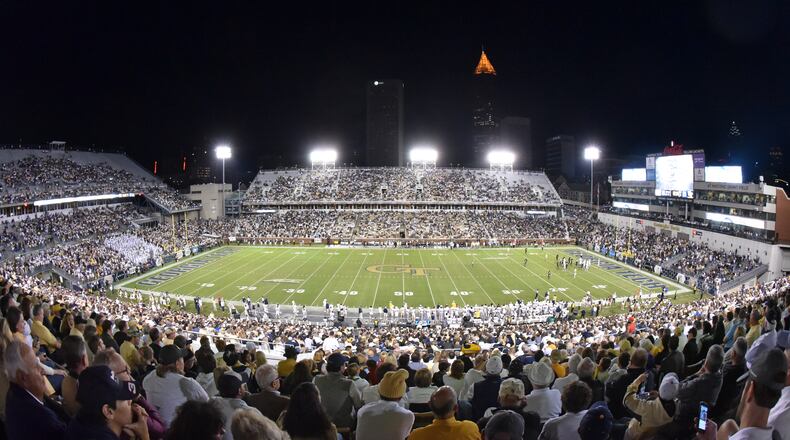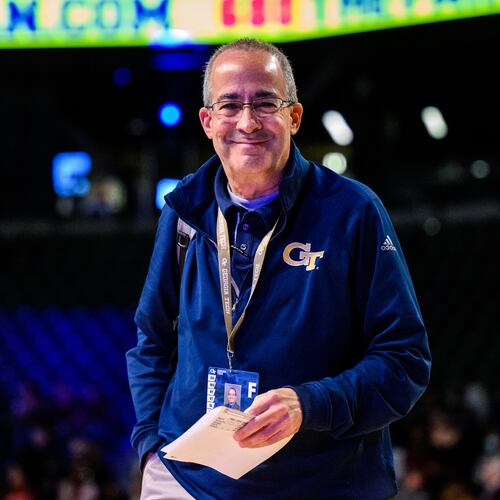A year of belt tightening is ahead for Georgia Tech. With revenues from ticket sales projected to fall by 40%, the athletic department will have to pare spending that already has been frugal.
“I will say there was a lot of heartburn with cutting costs and a very challenging exercise to find opportunities to contain costs, knowing that 70 percent of our budget is connected to our people, as well as facilities,” associate athletic director Marvin Lewis told the athletic association board at its quarterly meeting Thursday.
Lewis presented an $80.5 million balanced budget to the board, which was approved. It is 4% smaller than the budget for fiscal year 2020, which ends June 30. At a time when some Division I schools have eliminated dozens of non-revenue teams because of the coronavirus pandemic shriveling up revenues, the reduction is fairly modest.
However, making the ends meet will require furloughs for staff across the department, including coaches. The salary budget will be cut by $3.2 million, from $32.5 million to $29.3 million, a 10% decrease. The reduction will be achieved through tiered furloughs and a “critical review of all positions,” according to a budget document.
The furlough program was authorized by the University System of Georgia's board of regents for the state's colleges and universities because of an expected drop in state revenues because of COVID-19.
By the guidance of the furlough plan — Lewis said that the department will align with the USG and institute furlough program — faculty and staff making $154,000 or more in base salary will have 16 unpaid days off for a 6.2% reduction in pay. That tier would include many Tech coaches (starting with football coach Geoff Collins, basketball coaches Nell Fortner and Josh Pastner, baseball coach Danny Hall and a number of assistant coaches) as well as athletic director Todd Stansbury.
“We just know we’ve got to get through this next 12 to 18 months,” Lewis said.
The travel and recruiting budget was reduced by 24% — $7.1 million to $5.4 million — and spending for uniforms and equipment is planned to be cut from $1 million to $657,000.
Expected reductions in football attendance lie at the heart of the reduced revenue projections. The department projects to earn $13 million in ticket sales in the coming year, which assumes 50% attendance at football games and no changes in attendance for winter and spring sports. The department made $20.2 million in ticket sales last year, which itself was below its initial projection of $21.9 million. The drop-off is combined with anticipated reduced revenues in areas such as concessions, parking and merchandising.
“Football’s such a major driver for us,” Lewis said. “It generates about 60% of our total revenues. So any reductions in attendance do have a significant impact on our finances.”
The department will count on $32.5 million from the ACC, largely furnished by ESPN money for the ACC Network. Last year, in the network’s launch season, Tech received $29.2 million, which was under the projected $31.8 million in part because of the cancellation of the ACC men’s basketball tournament. So long as games are played this fall and winter, Tech and its ACC brethren will continue to receive the treasured television money.
To compensate for the losses in football ticket revenue, the department will scoop out 51% more money from its endowment funds — $14.7 million — than last year’s budget. For instance, Lewis said the department will draw 10% from its scholarship endowment fund, double the standard 5% withdrawal, adding another $2-2.5 million to the revenue side.
The Candler Fund, managed by former AD Homer Rice, will provide $1 million above the normal offering, Lewis said. It is no small gift. The fund’s value was $22.7 million June 30, 2019, but shrank to $17.9 million by the end of March because of almost $1 million in market losses and $3.9 million in withdrawals.
With fundraising for the athletic department’s $125 million capital campaign nearly complete — no small achievement given the financial climate — Lewis said that Stansbury and the A-T Fund would shift its priorities to raising money to meet operating expenses.
Lewis also espoused the hope that the installation of artificial turf in Bobby Dodd Stadium will enable the athletic department to host revenue-generating events such as concerts and high-school graduations. A concert could bring in as much as $1 million.
“We want to capitalize on the fact that we have a great facility, and now we’ll have turf that will be able to be managed a lot better than the traditional grass fields,” he said.
Tech is in the position of having to attempt a balanced budget because its reserve fund is $9 million in the hole. It was at a healthy $6.7 million in July 2018, but was drained by the coaching transition from Paul Johnson to Collins and then losses related to the pandemic.
Lewis spoke of the need to weather the storm and to be nimble in the face of many unknowns. As much as Tech is financially counting on revenues from football, as are athletic departments nationwide, it’s hardly a certainty that games will be played, or if fans will be permitted into stadiums.
“We feel confident about submitting a balanced budget going into next year, and last thing to note is that, going into the future, once we get past this 12-to-18-month challenge, the future looks bright,” Lewis said.
About the Author
Keep Reading
The Latest
Featured


